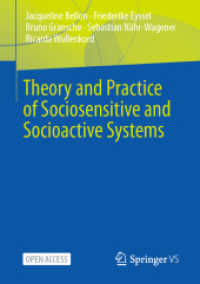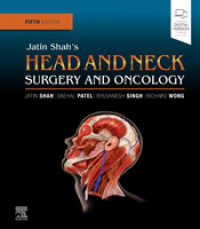- ホーム
- > 洋書
- > 英文書
- > History / World
Full Description
German attitudes toward and stereotypes of Russia before the First World War and how they were inculcated in the public.
The causes of the First World War have been studied and debated for many decades, yet cultural historians of Germany have largely neglected the German-Russian aspect of the conflict for a focus on the clash of Germany and Great Britain. When they have focused on Germany and Russia, they have too often dismissed the anti-Russian propaganda of the war's first months as a sudden and opportunistic campaign to justify the war. This intellectual and cultural history gives German attitudes toward and stereotypes of Russia their due, re-examining them through the lens of German national identity and revealing an evolving obsession with Russia during the quarter-century leading up to the war, when Germany came to consider itself a Western nation, with Russia, to use Edward Said's terminology, as an Oriental "other." While historians have addressed the issue of an Oriental Russia, this book extends the analysis beyond traditional intellectual history's focus on cultural elites by studying the construction of Russia in school textbooks, newspapers, and the writings of academics. Drawing upon the work of Said, Jürgen Habermas, Sander Gilman, and Pierre Bourdieu, Troy Paddock demonstrates that public debate on Russia was based on common assumptions, and contends that these assumptions -- which resulted in the ascendancy of a view of Russia as the "Slavic peril" in the last few years before the war -- were ingrained in the public through education.
Troy Paddock is Professor of History at Southern Connecticut State University.
Contents
Introduction
Heimat und Fremde: Depictions of Germans and Russians in Geography and History Textbooks
Russophobia and German Historians
Russia in the German Press
The Colossus with the Feet of Clay: The Russo-Japanese War and the Russian Revolution of 1905 in the German Press
The Emergence of the Russian Peril in the German Press
Anti-Russian Sentiment and the Outbreak of the War
Conclusion
Bibliography
Index








